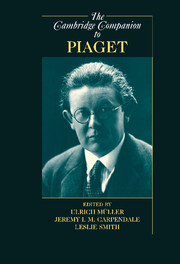Book contents
- Frontmatter
- 1 Introduction: Overview
- 2 The Historical Context Of Piaget’s Ideas
- 3 Piaget’s Developmental Epistemology
- 4 Piaget’s Biology
- 5 On the Concept(s) of the Social in Piaget
- 6 Piaget on Equilibration
- 7 Constructive Processes: Abstraction, Generalization, and Dialectics
- 8 Piaget and Method
- 9 Infancy
- 10 Childhood
- 11 Adolescence
- 12 Piaget’s Theory of Moral Development
- 13 Piaget’s Enduring Contribution to a Science of Consciousness
- 14 Piaget and Affectivity
- 15 Piaget’s Pedagogy
- 16 Piaget in the United States, 1925-1971
- 17 The Mind’s Staircase Revised
- 18 Dynamic Development: A Neo-Piagetian Approach
- Index
17 - The Mind’s Staircase Revised
Published online by Cambridge University Press: 28 March 2010
- Frontmatter
- 1 Introduction: Overview
- 2 The Historical Context Of Piaget’s Ideas
- 3 Piaget’s Developmental Epistemology
- 4 Piaget’s Biology
- 5 On the Concept(s) of the Social in Piaget
- 6 Piaget on Equilibration
- 7 Constructive Processes: Abstraction, Generalization, and Dialectics
- 8 Piaget and Method
- 9 Infancy
- 10 Childhood
- 11 Adolescence
- 12 Piaget’s Theory of Moral Development
- 13 Piaget’s Enduring Contribution to a Science of Consciousness
- 14 Piaget and Affectivity
- 15 Piaget’s Pedagogy
- 16 Piaget in the United States, 1925-1971
- 17 The Mind’s Staircase Revised
- 18 Dynamic Development: A Neo-Piagetian Approach
- Index
Summary
This chapter focuses on two related questions, both of which were central to Piaget's thinking. The first question concerns the extent to which there are nontrivial regularities in cognitive development and what these regularities consist in. The second question pertains to the development of necessary knowledge. I briefly show that in addressing these questions Piaget picks up a thread that can be traced back to the philosophers Hegel and Kant, respectively. Both questions are intricately intertwined with one of the most important but also most heavily criticized aspects of Piaget's work - his stage theory. Stages are important not just for the classification of abilities and problem-solving strategies: Stage theory is an instrument that clarifies the development of different aspects of human intelligence itself - logical thinking, imagination, symbolic functioning, bodily movements, etc. It is impossible to make reference to Piaget's stage theory without discussing the manifold criticisms leveled against it. These criticisms led many psychologists to abandon Piaget's theory and work with modular theories. Yet, as will be shown, modular theories fail to explain regularities in cognitive development aswell as the genesis of necessary knowledge. The most important objections against Piagetian stage theory are evaluated before the main features of his theory are reconstructed and the concepts of level, substage, and level transition explained. It will turn out that Piaget’s stage theory must be modified in some minor but important details. These alterations cast new light on developmental regularities and the genesis of necessary knowledge.
Information
- Type
- Chapter
- Information
- The Cambridge Companion to Piaget , pp. 371 - 399Publisher: Cambridge University PressPrint publication year: 2009
